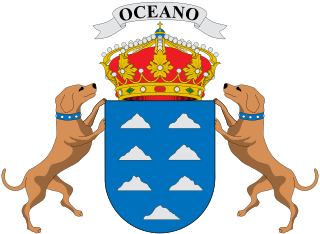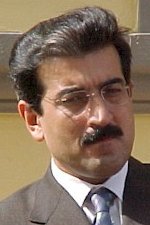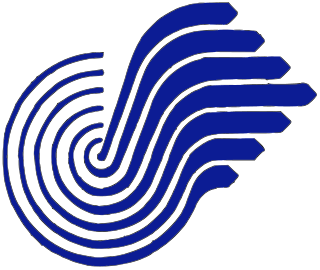Related Research Articles

The Canary Islands, also known informally as the Canaries, are a Spanish autonomous community and archipelago in Macaronesia in the Atlantic Ocean. At their closest point to the African mainland, they are 100 kilometres west of Morocco and the Western Sahara. They are the southernmost of the autonomous communities of Spain. The islands have a population of 2.2 million people and are the most populous special territory of the European Union.

The Canarian Coalition is a regionalist, Canarian nationalist political party in Spain operating in the Canary Islands. The party's aim is for greater autonomy for the islands but not independence. It has been labeled as centrist and liberal. The party governed the Canary Islands from 1993 to 2019; and currently since 2023 under Fernando Clavijo Batlle's leadership.
Miguel Zerolo Aguilar is a Canarian politician. He became a member of Unión de Centro Democrático in 1979, and subsequently transferred to Agrupación Tinerfeña de Independientes (ATI) in 1993.

Román Rodríguez Rodríguez is a Canarian politician who was the president of the Canary Islands between 1999 and 2003. He was licensed in medicine at the University of La Laguna. He worked as a medical assistant for one year and as a university professor.

The president of the Canary Islands is the head of government of the Canary Islands, one of the 17 autonomous communities of Spain, while the monarch Felipe VI remains the head of state as king of Spain.

Manuel Mora Morales is a Canarian writer, filmmaker and editor. He completed his studies at the University of La Laguna on the island of Tenerife. He is the president of the Asociación de Editores de Canarias.
Canary Islanders, or Canarians, are the people of the Canary Islands, an autonomous community of Spain near the coast of northwest Africa. The distinctive variety of the Spanish language spoken in the region is known as habla canaria or the (dialecto) canario. The Canarians, and their descendants, played a major role during the conquest, colonization, and eventual independence movements of various countries in Latin America. Their ethnic and cultural presence is most palpable in the countries of Uruguay, Venezuela, Cuba and the Dominican Republic as well as the U.S. territory of Puerto Rico.

Canarian nationalism is a political movement that encourages the national consciousness of the Canarian people. The term includes several ideological trends, ranging from a demand for further autonomy within Spain to the right to self-determination.

Jerónimo Saavedra Acevedo was a Spanish politician and academic. He served as President of the Canary Islands twice, from 1983 to 1987, and again from 1991 to 1993.

Spanish immigration to Cuba began in 1492, when the Spanish first landed on the island, and continues to the present day. The first sighting of a Spanish boat approaching the island was on 27 October 1492, probably at Bariay on the eastern point of the island. Columbus, on his first voyage to the Americas, sailed south from what is now The Bahamas to explore the northeast coast of Cuba and the northern coast of Hispaniola. Columbus came to the island believing it to be a peninsula of the Asian mainland.

Paulino Rivero Baute is a Spanish politician and teacher. A member of the Canarian Coalition, he is the former president of the autonomous community of the Canary Islands.
Antonio Rodríguez Medero was the mayor of San Antonio, Texas, in 1741. He was one of the first settlers in San Antonio. He laid the foundation for the creation of the first "heritage of water" in the United States. He was also the architect of the construction of several canals to irrigate the lands of the Canarian settlers in San Antonio. These heritage of water would serve as a model for all those that were created later in San Antonio.

The 1999 Canarian regional election was held on Sunday, 13 June 1999, to elect the 5th Parliament of the Autonomous Community of the Canary Islands. All 60 seats in the Parliament were up for election. The election was held simultaneously with regional elections in twelve other autonomous communities and local elections all throughout Spain, as well as the 1999 European Parliament election.
Canarian Assembly was a left-wing nationalist political party operating in the Canary Islands. The party aims were self-determination for the islands, workers' self-management and socialism.
Canarian Americans are Americans whose ancestors came from the Canary Islands, Spain. They can trace their ancestry to settlers and immigrants who have emigrated since the 16th century to the present-day United States. Most of them are descendants of settlers who immigrated to Spanish colonies in the South of the modern US during the 18th century. The Canarians were among the first settlers of the modern United States; the first Canarians migrated to modern Florida in 1569, and were followed by others coming to La Florida, Texas and Louisiana.

The Canarian Independent Groups were a Spanish political party based in the Canary Islands that existed from 1985 until its integration in Canarian Coalition.
Canarian Convergence was a centrist Canarian nationalist political party operating in the Canary Islands.
The Agreement of Nationalist Unity, frequently known under the name of its constituent parties, Canarian Coalition–Canarian Nationalist Party, was a permanent Canarian nationalist alliance formed by Canarian Coalition (CC) and Canarian Nationalist Party (PNC) in 2006 ahead of the 2007 Canarian regional election. The alliance has been renewed several times, in 2011, 2013 and 2018. For the 2011 and November 2019 general elections it was joined by New Canaries (NC). The alliance was dissolved in 2023, with the PNC arguing that the CC had now « nothing of nationalist »

Ángel Víctor Torres Pérez is a Spanish politician currently serving as minister for Territorial Policy and Democratic Memory since 2023 and secretary-general of the Socialist Party of the Canaries (PSC–PSOE) since 2019. Before that, he served as president of the Canary Islands from 2019 to 2023.
References
- ↑ "Coalición Canaria". historiaelectoral.com (in Spanish). Retrieved 9 August 2010.
- ↑ "Tres millones de euros para Manuel Hermoso y familia". Canarias Ahora.es. Retrieved 9 August 2010.